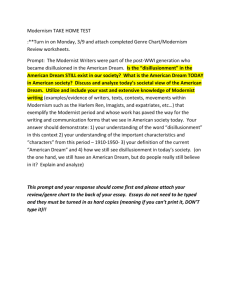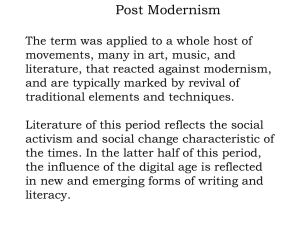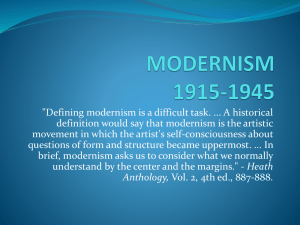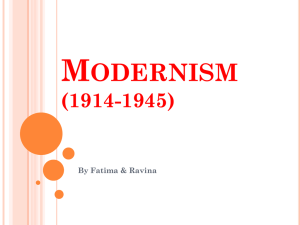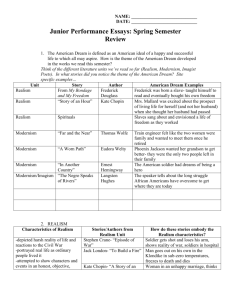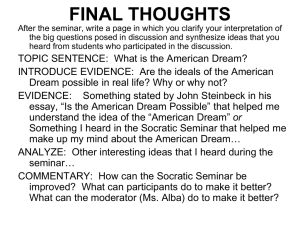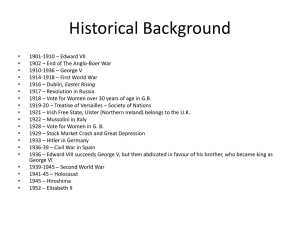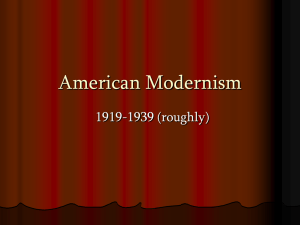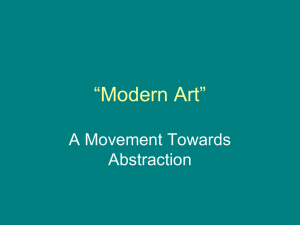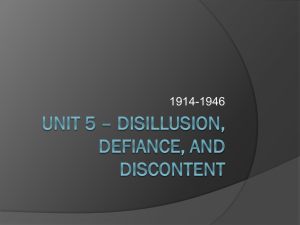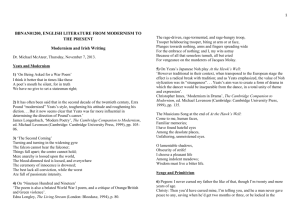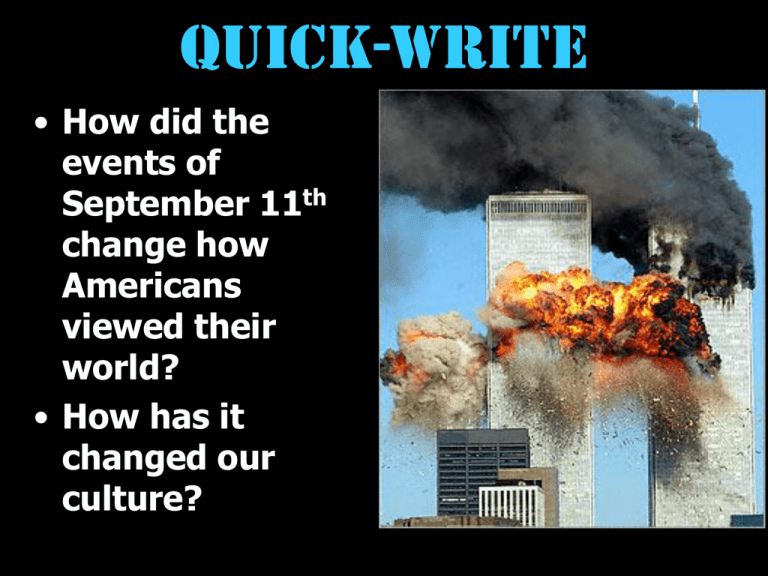
Quick-write
• How did the
events of
September 11th
change how
Americans
viewed their
world?
• How has it
changed our
culture?
MODERNISM
(1914 – 1940)
Learning Target: I can summarize the tenants of
modernism
What is Modernism?
• Modernism reflects a loss of
faith in traditional values
and beliefs, including the
American Dream.
– Artistic/literary
movement
– Post World-War One
– Pessimistic picture of
culture in disarray
– Modern poets goal = rid
poetry of 19th century
prettiness &
sentimentality
– Rejected 19th century
optimism
The WORLD AS A WASTELAND
WORLD AS A WASTELAND
Before WWI
WORLD AS A WASTELAND
After WWI
WORLD AS A WASTELAND
Before WWI
WORLD AS A WASTELAND
After WWI
Q: What are some factors that led
people during this time period to lose
faith in the American Dream?
A:
-World War I &
disillusionment,
-Increase in
industrialization,
-Unfair labor
practices,
-Excessive drinking
Characteristics of Modernism
1. instability
2. futility
3. pessimism
4. chaos
5. Loss of
faith
6. Collapse of “Morality”
Prohibition, “flappers,”
more open about
sexuality, drug-use
7. Disillusionment: a feeling of
disappointment resulting from the
discovery that something is not as good as
one believed it to be
Characteristics of
Modern Literature
• New experiments with
form and technique in
both poetry and prose
• A new kind of hero
who is flawed and
disillusioned yet
honorable and
courageous
• Questioning of
traditional beliefs and
social structures
Introduction:
“the seCond CoMing”
BY: William Butler Yeats 1919
• After reading this poem,
answer the following
questions.
• Then SOAPSTone the
poem:
– How is this a good example of
modern poetry?
– What kind of world did Yeats
propose that we were entering
when he wrote this poem?
– How accurate was his
prophecy for the future?
– SOAPSTone
MODERNISM REVIEW
and connection to
The Great Gatsby
Learning Targets:
• I can summarize the tenants of modernism
• I can explain how an author’s choice contributes
to overall meaning
What are the seven Characteristics
of Modernism?
1. instability
2. futility
3. pessimism
4. chaos
5. Loss of
faith
6. Collapse of
“Morality”
7. Disillusionment
DIRECTIONS: In the box to the right of the picture,
write down five details that you notice about the picture
below (what does image include in the foreground,
background? What colors are used? Is it inviting or
uninviting? etc).
What aspects of this picture
connect to the modernist
characteristics? How does this
picture reflect the ideals of
this era?
Scene Capture:
PURPOSE: to connect the characteristics of modernism to The Great Gatsby
STEP 1: Read the assigned passage aloud to your group.
Take turns reading aloud to one another.
STEP 2: Complete job A, B, C, or D
(Themes: Hollowness of upper class, wealth as a
of power, disillusionment, failure of American
Dream)
STEP 3: Present to the class your poster
STEP 4: While listening, take notes on other groups’
presentations in your packet (there is a box for notes)
STEP 5: Fill out the questions in the packet under the
heading “Exit Slip”
Responding to Essential Questions
Step 1: Write
the Essential
Question wordfor-word in
your notes.
Step 2: Write
2-3 sentences
relating to the
question.
**Responses should be an initial reaction,
personal experience, or answer to the question**
Each theme topic relates to an
essential question.
WRITE THESE DOWN and
formulate a response to each.
Have essential questions in
mind while reading.
These are just a few big ideas
found in the novel.
• Not all have same
opportunity
• Hard work may not
be as important as
heredity
• Do money &
possessions equal
happiness?
• Fitzgerald’s wife,
Zelda, would only
marry him after he
sold his first book,
This Side of
Paradise.
Does America have a ruling class? Can just
anyone grow up to be president?
Is there a dark side to the
American Dream?
Is it attainable for
everyone?
What are the dangers of
ambitiously following one’s
dream?
Repeating the Past
Essential Question #2:
What does it mean to live in the
past?
Is constantly searching for the
happiness of your past healthy?
• Post-WWI: chaos & destruction
• Excess of violence
• Modernism: result of disillusionment w/
the world after WWI and a feeling that
traditional customs and beliefs were
outdated
• Widespread “immorality”
– Excess of sex
– Excess of drugs/alcohol abuse
– Flappers/Parties
– Fitzgeralds were the “it” couple
of Roaring 20s
– Money & Prestige = goal of the
individual
Given the immorality and decadence of
the 1920s and today’s society, is the world
spiritually and morally broken?
Is money necessary in order
to achieve happiness?
Can money buy happiness?

